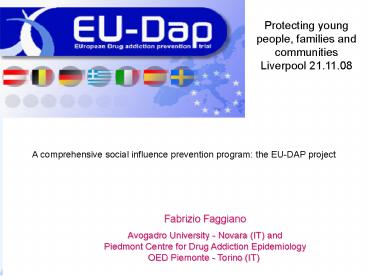Diapositiva 1 PowerPoint PPT Presentation
1 / 22
Title: Diapositiva 1
1
Protecting young people, families and
communities Liverpool 21.11.08
k K
A comprehensive social influence prevention
program the EU-DAP project
Fabrizio Faggiano Avogadro University -
Novara (IT) and Piedmont Centre for Drug
Addiction Epidemiology OED Piemonte - Torino (IT)
2
Background
- Systematic Reviews on effectiveness of school
based primary prevention of tobacco use and on
alcohol abuse do not show evidence of
effectiveness (Thomas 2006, Foxcroft 2004) - A systematic review on prevention of illegal
drugs use showed that programs based on life
skills appear to reduce the use of substances of
about 27 (Faggiano 2005) - But 28/29 RCTs included are from America or
Australia! - There is a major concern on generalisability
3
Characteristics of the EU-Dap trial
- EU-Dap is an experimental study
- involving 9 centers in 7 European Countries
- funded by European Commission (Public Health
Program) - supported by EMCDDA
- for the evaluation of a school program
(Unplugged) - to prevent tobacco, alcohol and drugs onset
- especially conceived by an internal expert group
4
GERMANY / Kiel IFT-Nord
SWEDEN / Stockholm Centre for Tobacco Prevention
BELGIUM / Gent De Sleutel
AUSTRIA / Wien ISG
ITALY / LAquila University of LAquila
SPAIN / Bilbao EDEX
GREECE / Thessaloniki REITOX/PYXIDA
ITALY / Turin Piemonte Monitoring Centre for Drug
Abuse
ITALY / Novara Medical Sciences Dept / Avogadro
University
5
Unplugged
- the program is based on a Comprehensive Social
Influence approach - It includes the following components
- Social skills
- Personal skills
- Knowledge
- Normative education
- (No resistance education)
- It is administered by teachers trained in a
3-days course - It is made by 12 units, 1 hour each
- It is designed for 12-14 years old students
6
Unplugged
Unplugged can be downloaded by www.eudap.net
7
Study design
- Cluster Randomised Controlled Trial
- Sample of centres schools randomised and
students analysed - 3 intervention arms
- Basic - Unplugged
- Basic peer component
- Election of 2 representatives of the classmates
(same age), training, 7 meetings - Basic parent component
- 3 seminars for parents
- Control arm usual curriculum
- Each centre was free to involve students from 12
to 14 years
8
Enrollment
- 7079 students participated in the baseline
survey (November 2004) - The program was administered between November
2004 and February 2005 in the intervention arms - 6604 (93) students participated in the first
follow-up survey (May 2005), 3 months (at least)
after the end of the program - 5812 (82) students participated in the second
follow-up survey (May 2006), 15 months (at least)
after the end of the program
9
Enrollment by centre 1 year follow-up
10
Programme implementation
- 56 of classes implemented 12/12 units
- 66 at least 10/12
- 77 at least 6/12
- 5 did not implemented any unit
11
The questionnaire
12
Gender differences cigarettes smoking
13
Drunkenness episodes
14
Smoking cannabis
15
Effect of the program daily smoking
16
ALO drunkenness
17
ALO cannabis
18
Changes in prevalence
Any episode of drunkenness
Any use of cannabis
Daily smoking
19
Adjusted statistical analysis
- A Multi-Level model was used to
- Adjust for the cluster effect
- Take into account the differences in the
prevalence of use among centers - Take into account the differences in the
prevalence of use among arms (the controls show
higher prevalences of use at the baseline)
20
Short-term results
all interventions vs control group 3 months
after the end of the program
21
Transition among stages smoking
The program works better in preventing (or
delaying?) the use more than promoting the
cessation
22
Results 15-month follow-up
all interventions vs control group 15 months
after the end of the program
23
Transition among stages 15 months FU
Tobacco use in past 30 days
24
Transition among stages 15 months FU
Drunkenness episodes in past 30 days
25
Transition among stages 15 months FU
Cannabis use in past 30 days
26
Short-term vs 15 months follow-up results
27
Analysis by Socio Economic Status
Prevalences of use at baseline were higher for
all substances in the low SES group
28
Possible reduction in SES inequalities
The analyses suggest a possibe reduction of the
inequalities among low and high SES The distance
in prevalence among the two groups seems reduced
29
Cost/effectiveness measure NNT
NNT number needed to treat ? number of
subjects to be treated to prevent one event
30
Gender differences
- among females
- results are not statistically significant
- no effect is detectable for smoking, cannabis
and drugs
31
Conclusions on the effect
- The statistical analysis shows that Unplugged is
effective in reducing use of drugs, alcohol and
cigarettes at the post-test - and the results are maintained for alcohol (and
cannabis) at the 15-month follow-up - The program works better in preventing the use
more than promoting cessation, especially for
smoking and cannabis - Striking gender differences in effectiveness are
shown, and some hypothesis can be done for
explanetion (age susceptibility, rational
approach)
32
Conclusions on cost/effect
- NNTs at 15 months are 34 for cannabis use and 26
for drunkenness - The cost of the program for 1 class is about 200
- Thus the cost of preventing (or delaying for 1.5
years) one onset of cannabis use and alcohol
intoxication is near to 200

